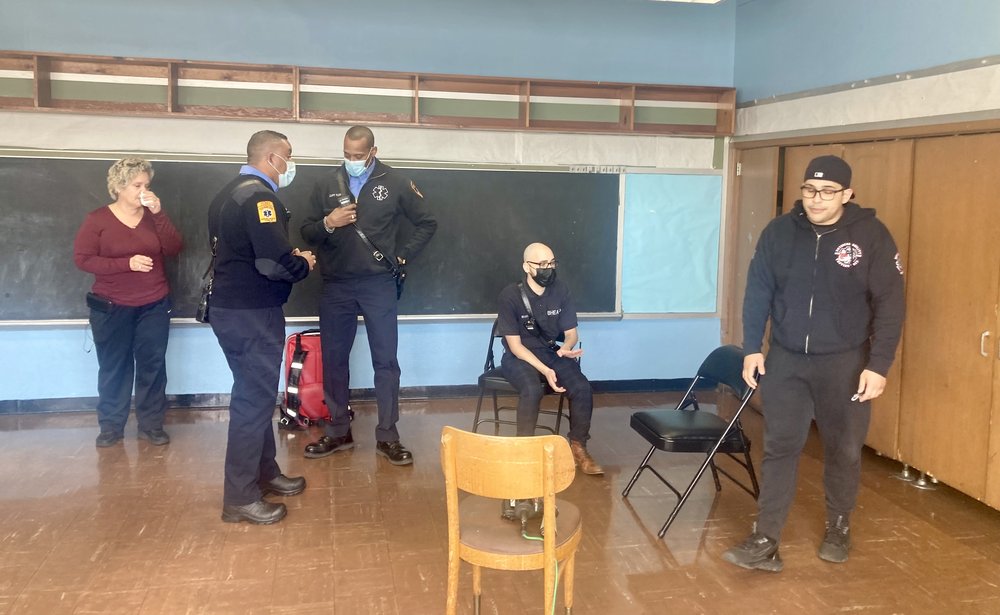Mental health professionals will accompany cops on some 911 calls in North Jersey
June 6, 2022, 1:03 p.m.
The program aims to change the way law enforcement statewide handles mental health crises, avoiding tense incidents that can end in police killings.

Beginning this summer, a mental health professional will arrive along with a police officer in a modified uniform and in an unmarked car at some 911 calls for behavioral health crises in two cities in North Jersey.
The program, already underway as a pilot in rural South Jersey, is part of the state attorney general’s plan to change the way law enforcement statewide handles mental health crises and avoid police killings.
“This program is a recognition by law enforcement, as well as by the communities, that there are actually people with better expertise in handling an incident of emotional or mental distress,” Acting New Jersey Attorney General Matt Platkin told Gothamist.
Called ARRIVE Together, the program is limited, for now. It will run twice a week during the day in Elizabeth and adjacent Linden, with one officer assigned from each city’s police department and a mental health screener from Trinitas Regional Medical Center. Each officer in the program will wear a shirt that says “police” and arrive in an unmarked patrol car without flashing lights, according to Elizabeth Police Chief Giacomo Sacca.
“When you’re dealing with someone in a mental health episode, you want to have the least amount of triggers as possible,” Sacca said. There has been a spike in emergency calls about people going through mental health crises since the start of the pandemic in Elizabeth, the fourth largest city in the state, according to Sacca.
The use of deadly force by police “overwhelmingly involves cases of mental health or emotional distress,” Platkin said. And so in these instances, the hope is that the officer and mental health screener “can divert those individuals away from the criminal justice system to the mental health system and really provide them the care that they need.”
Cities across the country are beginning to dispatch mental health professionals as first responders for behavioral health crisis. But compared to other cities, the New Jersey plan is more police-focused. In Eugene, OR, for example, crisis intervention personnel — not officers — are the first responders on certain calls.
New York City’s version of this approach, B-HEARD, involves one social worker and two EMTs or paramedics dispatched to behavioral health emergencies in Harlem, Washington Heights, and the South Bronx. The 911 operator is empowered to determine whether there’s a threat of violence, and if not, B-HEARD is called without police accompaniment.
Some mental health professionals say police officers shouldn’t be involved at all in mental health calls, since they aren’t trained to deal with those experiencing crises, and they too often revert to violence. Plus, sirens and armed officers can be further triggering and traumatizing to such individuals.
But Sacca, the police chief, said it’s impossible to know in advance if the situation could get violent. “The model of having a mental health and police officer there, it’s the best of both worlds,” he said.
“ARRIVE” is an acronym for “Alternative Responses to Reduce Instances of Violence & Escalation.” The state Attorney General’s Office is paying the salaries of the mental health screeners. During the ARRIVE Together pilot program in Cumberland County, which has operated twice a week since December, state police and their mental health partners responded to 36 calls, Platkin's staff said. Eight individuals were hospitalized, and there were 21 follow-up visits by the mental health screeners — to check on someone who had experienced suicidal ideations, for example, they said. They said there were no uses of force.
Correction: A previous version of this article incorrectly stated how many calls the ARRIVE Together program in Cumberland County has responded to. The New Jersey Attorney General's office said program staff have responded to 36 calls since the pilot launched in December.
Quite frankly, we’re not experts in the mental health field like these screeners are
New Jersey State Police Captain Robert Gates
New Jersey State Police Captain Robert Gates, who oversees ARRIVE Together in Cumberland, said having an officer there with the mental health screener helps to make the screener feel more comfortable. And the officers have appreciated the screeners’ expertise. “Quite frankly, we’re not experts in the mental health field like these screeners are,” he said.
Platkin said he envisions growing the program. “Absolutely it is our goal to scale this up and do something that can benefit every community in the state all the time,” he said.
In addition to preventing use of force, and connecting those in need with mental health support, Platkin hopes it can help “to rebuild and strengthen that trust with communities.”
Police in New Jersey have shot and killed seven people this year, according to state records. In April, two police officers in Edison, NJ, shot and killed a 49-year-old man, who relatives say was suffering from schizophrenia, during a confrontation outside of his apartment complex.
As a matter of policy, the Attorney General’s Office in New Jersey presents every case involving use of force to a grand jury for possible prosecution. But even if no charges are brought against such officers, Platkin said, that “doesn’t mean we couldn't have done things differently to prevent loss of life.”